Learning through Play in Tanzania
Teachers Paul and Beatrice share their experiences.
Aug 06, 2024
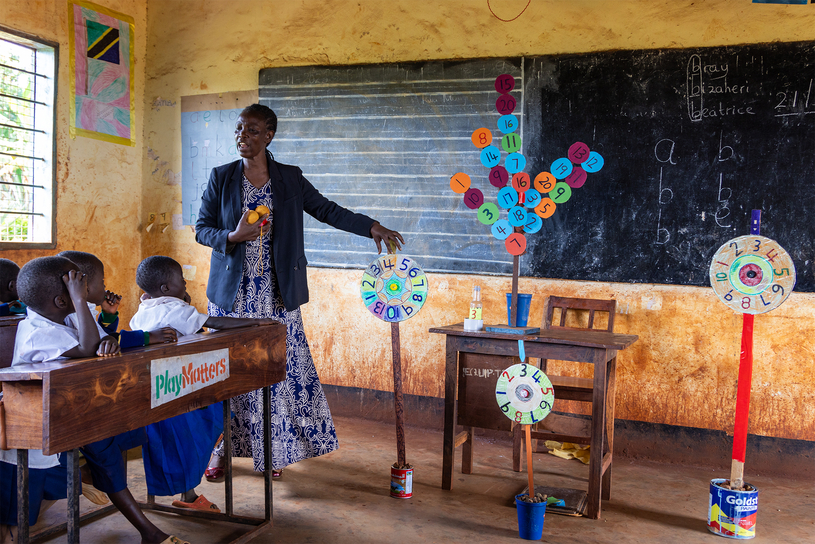
Having benefitted from training in applying Learning through Play methodologies in class, teachers Paul and Beatrice share how the enthusiasm for learning in their students has changed.
Beatrice, 57, is a teacher at Rubanga Primary School in Kibondo, Tanzania. She teaches Language, Mathematics, Science, Technology, Arts and Sports to a class of 61 preprimary school children, of which 37 are boys and 21 are girls. Early this year, she started using Learning through Play (LtP) approaches in her class following a training she received from Plan International under the PlayMatters project.
PlayMatters empowers teachers to leverage learning approaches that build upon a child’s natural desire to play. At its core, Learning through Play, is defined as an active teaching and learning method in which children learn through guided, hands-on, meaningful, play-based interactions in safe and inclusive environments. This approach fosters the development of essential life skills, improves children’s mental health and resilience, and cultivates a love of learning.
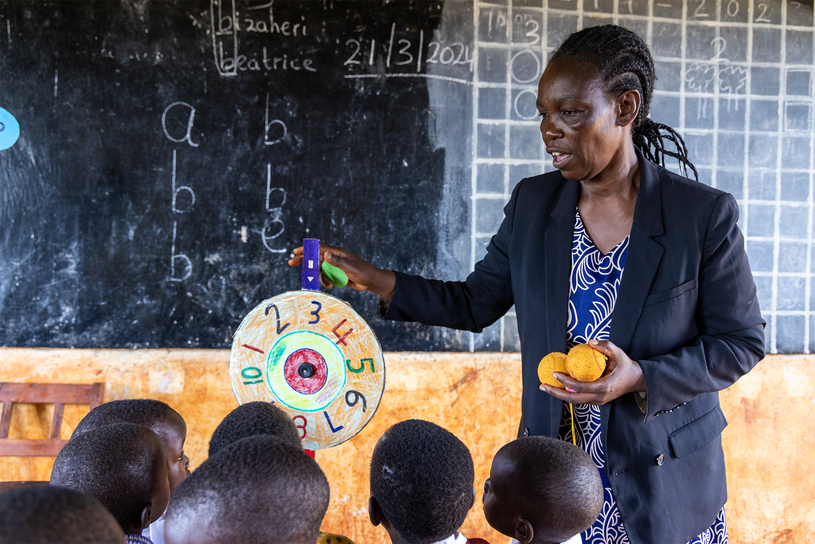
Beatrice teaches using locally made teaching and learning materials.
When you enter Teacher Beatrice’s class, which is comprised of children ages 5 to 6, it is evident that the training was not in vain. The class is bursting with colourful teaching and learning materials, all made from locally available materials such as paper, wood, cups, and bottles, among others.
“I have seen changes in my students. They learn quickly, they learn in unity, they play in groups, they answer questions very well. It is different from when we were not using Learning through Play methodologies,” teacher Beatrice said.
Using Groups to Foster Participation
Her lesson does not end without her engaging the children in a game outside the classroom. Here she groups children to ensure every child has a chance to participate. “I find collaborative ways to make sure that all learners are included in the lesson. I use small groups and games and ensure I keep using LTP approaches,” she explains.
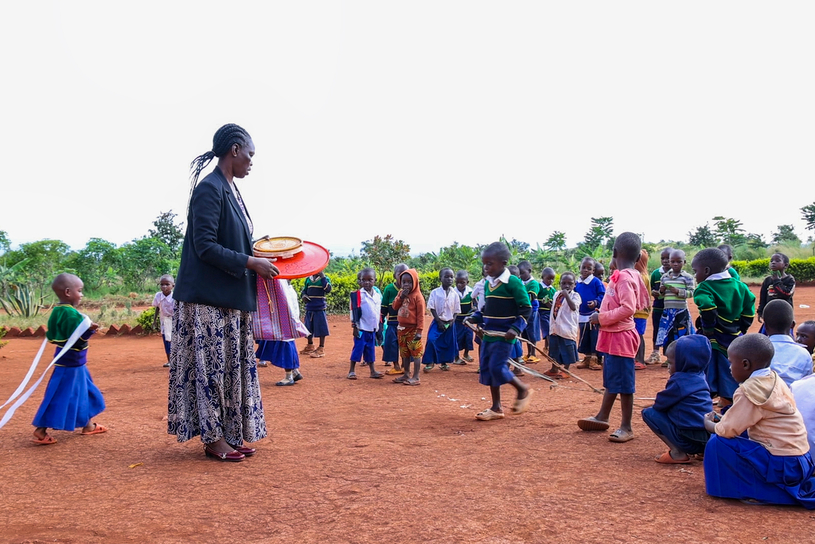
Beatrice ensures she takes her children to play outside the class before her lesson ends. Here she employs group work approach to ensure every child gets a chance to participate alongside their colleagues.
And you can tell from how learners relate to her that they are enjoying the lessons. When grouped, the children are eager to join and learn with their classmates. Often you will hear her calling on them to wait before they start a game or pick teaching and learning materials as they are usually too excited about starting.
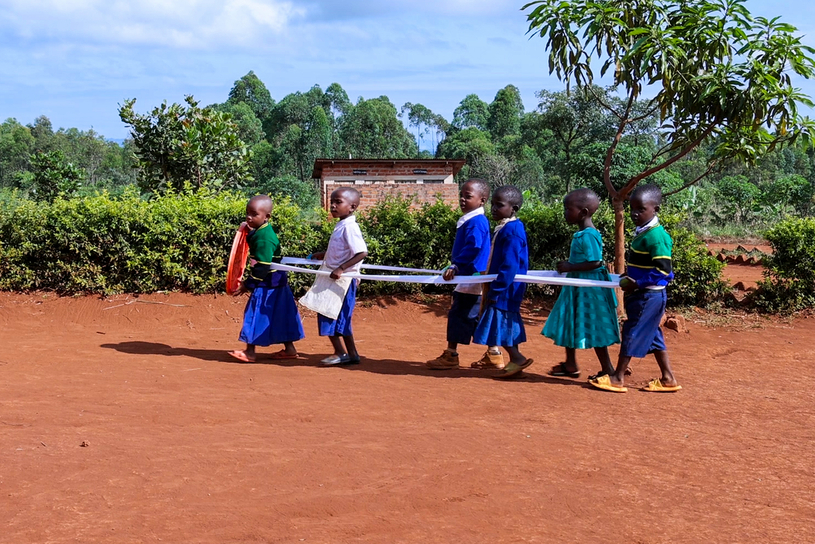
Children from teacher Beatrice’s class use a driving game to learn leadership skills and teamwork.
Beatrice has also been keen on peer-to-peer learning with fellow teachers at her school to enable them to motivate one another and learn together. “Previously most of the teachers understood play as going outside to play football or netball. But after understanding learning through play as a teaching method, now we sit together and advise each other which kinds of games are preferably according to the level the students are at. And we do this often to make sure all things go well,” she said.
Developing Critical Skills in Learners
Beyond Beatrice, Paul, 30, a teacher at Herushingo Primary School, teaches a class of 280 learners (144 girls and 146 boys). Paul has been teaching for six years and credits his father for inspiring him to be a teacher. According to Paul, despite completing teacher education in college in 2015, it is through the Learning through Play training that he learnt various methodologies of engaging learners.
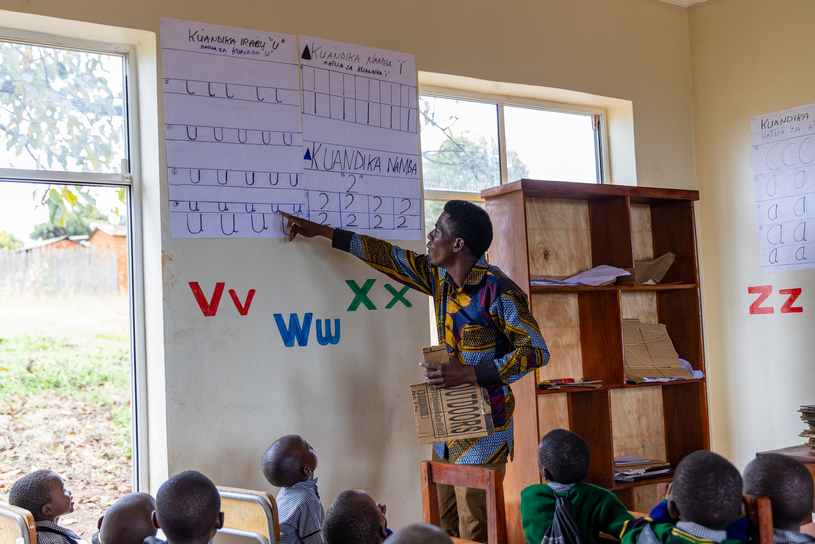
Teacher Paul says using Learning through Play methodologies in his class has made his learners be enthusiastic about learning.
“Through Learning through Play, I teach six skills. Today, I was teaching communication skills, reading and writing skills where I teach my learners to read and write vowels. I started with a step-by-step introduction to vowels; A E I O U using letter cards,” Paul said.
Without a doubt, Paul adds that he has witnessed the enthusiasm towards learning grow in his students. “Since I started using learning through play methodologies, my learners are more motivated in learning and are enjoying the classes. I can see attendance rates to increase because of children seeing their friends enjoying school and are now also interested coming to learn.”
Advice to Teachers
With how easy it has become for Beatrice and Paul to engage their students; they are calling upon all teachers to embrace Learning through Play.
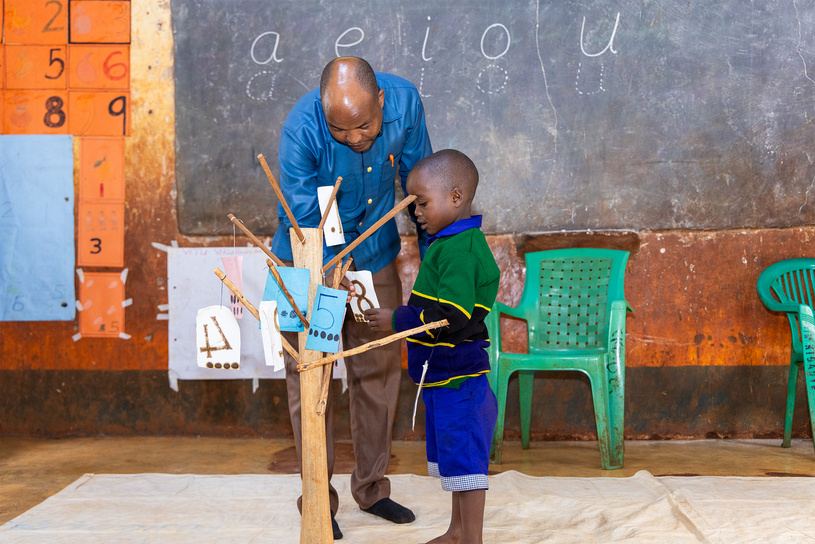
Teachers in Tanzania are using locally available items to make teaching and learning materials for their learners.
“I advise teachers to use Learning through Play approaches. First, it helps students to understand the lesson and enjoy. And it is very easy to prepare teaching and learning materials without necessarily going to buy them because they can be created from the surrounding environment,” Beatrice advises.
In as much as teachers have a big role to play in the success of Learning through Play, parents, too, are crucial in this success. Paul advises, “Teachers should use Learning through Play methodologies because they motive students to learn more but also to improve their skills. And to parents, I advise that they should continue bringing their children to school because we need a better future for our children and our community.”
And Beatrice hopes that her students will make it through all the education levels. “I have huge expectations of my students. To understand how to count, while competent in reading, writing and counting and I wish all the best for them to proceed well to all educational levels.”
PlayMatters in East Africa seeks to improve the holistic development and wellbeing of 800,000 refugee and host community children in East Africa using Learning through Play teaching methods. The project is implemented by a consortium led by the International Rescue Committee, including Plan International, War Child Alliance, the Behavioural Insights Team, and Innovations for Poverty Action, in partnership with the LEGO Foundation.
In Tanzania, the International Rescue Committee (IRC) and PLAN International are implementing the PlayMatters project in the refugee camps and host communities, in Kasulu and Kibondo respectively. The project targets to reach an estimated 180,000 learners in five years and has so far reached 93,412 children in 107 schools in Tanzania.